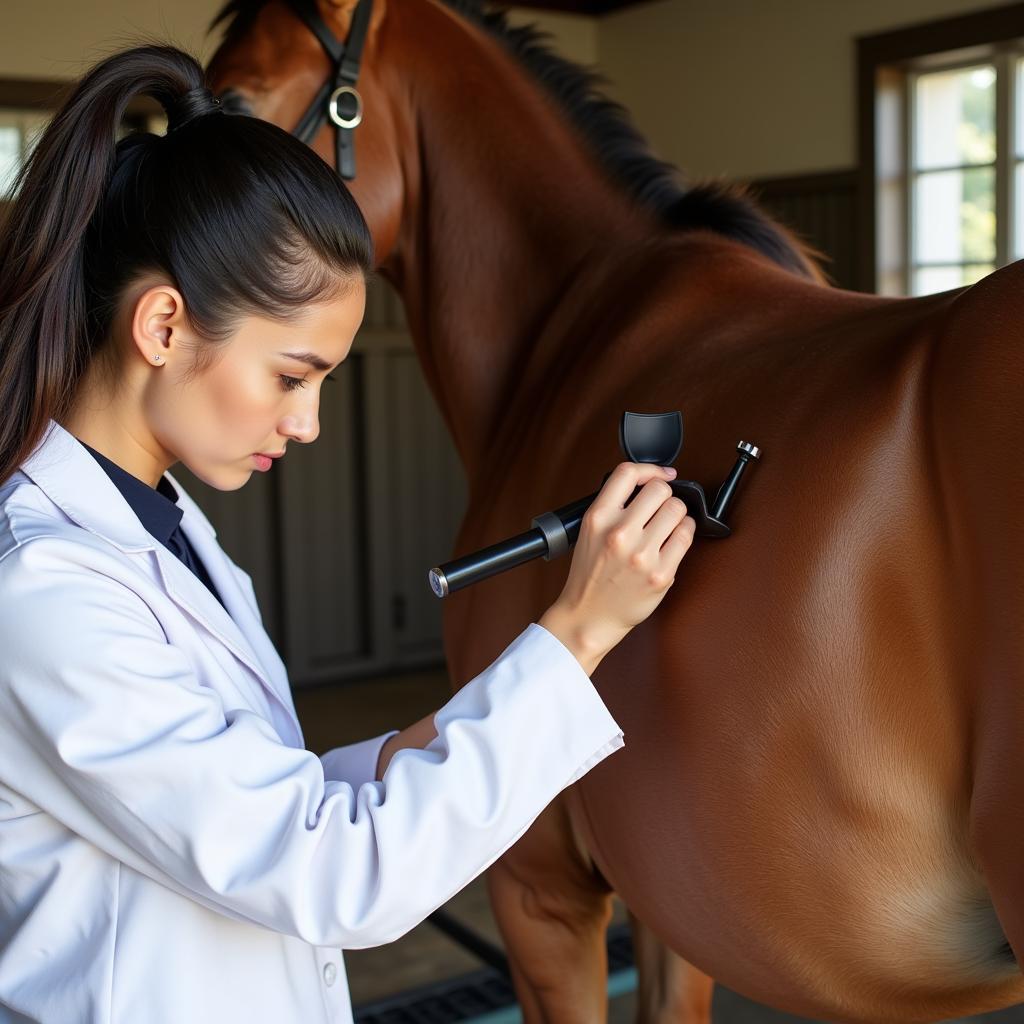Antifungal Treatment For Horses is crucial for addressing various fungal infections that can affect their skin, hooves, and respiratory system. Understanding the causes, symptoms, and treatment options is essential for every horse owner. This guide will provide you with a comprehensive overview of antifungal treatment for horses, empowering you to provide the best possible care for your equine companion.
Understanding Fungal Infections in Horses
Fungal infections, also known as mycoses, can range from minor skin irritations to serious systemic illnesses. They are often caused by opportunistic fungi that thrive in warm, moist environments. Factors like compromised immunity, prolonged antibiotic use, and poor hygiene can increase a horse’s susceptibility to these infections. Common fungal infections in horses include ringworm, rain rot, thrush, and various forms of dermatitis. Recognizing the early signs of these infections is vital for effective treatment.
Common Types of Fungal Infections
- Ringworm: A highly contagious fungal infection characterized by circular, scaly lesions on the skin.
- Rain Rot: A bacterial infection often complicated by secondary fungal infections, leading to matted hair and painful sores. Learn more about managing this condition with our guide on blue kote for horses.
- Thrush: A fungal infection affecting the frog of the hoof, often caused by poor stable hygiene.
- Dermatitis: Various forms of skin inflammation, some of which can be caused or exacerbated by fungal infections.
Diagnosing Fungal Infections
Diagnosing a fungal infection in horses typically involves a combination of physical examination and laboratory tests.  Veterinarian examining a horse for fungal infection A veterinarian will assess the appearance of the affected area and may take skin scrapings or hair samples for microscopic examination and fungal culture. These tests help identify the specific type of fungus involved, guiding treatment decisions.
Veterinarian examining a horse for fungal infection A veterinarian will assess the appearance of the affected area and may take skin scrapings or hair samples for microscopic examination and fungal culture. These tests help identify the specific type of fungus involved, guiding treatment decisions.
When to Call the Vet
If you suspect your horse has a fungal infection, prompt veterinary attention is crucial. Early intervention can prevent the spread of infection and minimize discomfort for your horse. Delaying treatment can lead to more severe and complicated cases, requiring more aggressive and prolonged antifungal treatment.
Antifungal Treatment Options for Horses
Various antifungal treatments are available for horses, ranging from topical creams and ointments to oral medications. The specific treatment approach depends on the type and severity of the infection.
Topical Treatments
Topical antifungal medications are commonly used for localized skin infections. These include creams, ointments, and shampoos containing active ingredients like miconazole, clotrimazole, or ketoconazole. You can find more information about topical treatments like Nu-Stock in our dedicated article about nu stock for horses.
Oral Medications
For more severe or systemic fungal infections, oral antifungal medications may be necessary. These are prescribed by a veterinarian and require careful monitoring.
Natural Remedies
Some horse owners explore natural remedies like neem oil horses for managing fungal infections. While these remedies may offer some benefits, it’s essential to discuss their use with a veterinarian to ensure safety and efficacy.
Preventing Fungal Infections in Horses
Preventing fungal infections is often easier than treating them. Good stable hygiene, proper nutrition, and regular grooming play crucial roles. Keeping your horse’s environment clean and dry can significantly reduce the risk of fungal growth. Also, address skin conditions like mallenders in horses promptly as they can create an environment conducive to fungal infections. You can explore more about overall fungal treatment in horses on our horse fungus treatment page.
Expert Insight: Dr. Emily Carter, DVM, emphasizes the importance of preventative measures, stating, “Maintaining a clean and dry environment for your horse is paramount in preventing fungal infections. Regular grooming and proper hoof care are equally important.”
Conclusion
Antifungal treatment for horses requires a comprehensive approach involving accurate diagnosis, appropriate medication, and diligent management. By understanding the various aspects of fungal infections and implementing preventative measures, you can protect your horse from these common equine health concerns. Remember, early detection and treatment are crucial for successful outcomes.
FAQ
- What are the signs of a fungal infection in horses?
- How are fungal infections in horses diagnosed?
- What are the treatment options for fungal infections in horses?
- How can I prevent fungal infections in my horse?
- Are natural remedies effective for treating fungal infections in horses?
- What are the risks of untreated fungal infections in horses?
- When should I contact a veterinarian for a suspected fungal infection?
Common Scenarios and Questions
-
Scenario: You notice circular, scaly patches on your horse’s skin.
-
Question: Could this be ringworm, and what should I do?
-
Scenario: Your horse’s frog is black and smells foul.
-
Question: Is this thrush, and how should I treat it?
Further Reading
For more information on related topics, explore our articles on various horse health concerns.
When you need assistance, please contact us at Phone Number: 0772127271, Email: [email protected], or visit our address: QGM2+WX2, Vị Trung, Vị Thuỷ, Hậu Giang, Việt Nam. We have a 24/7 customer service team.